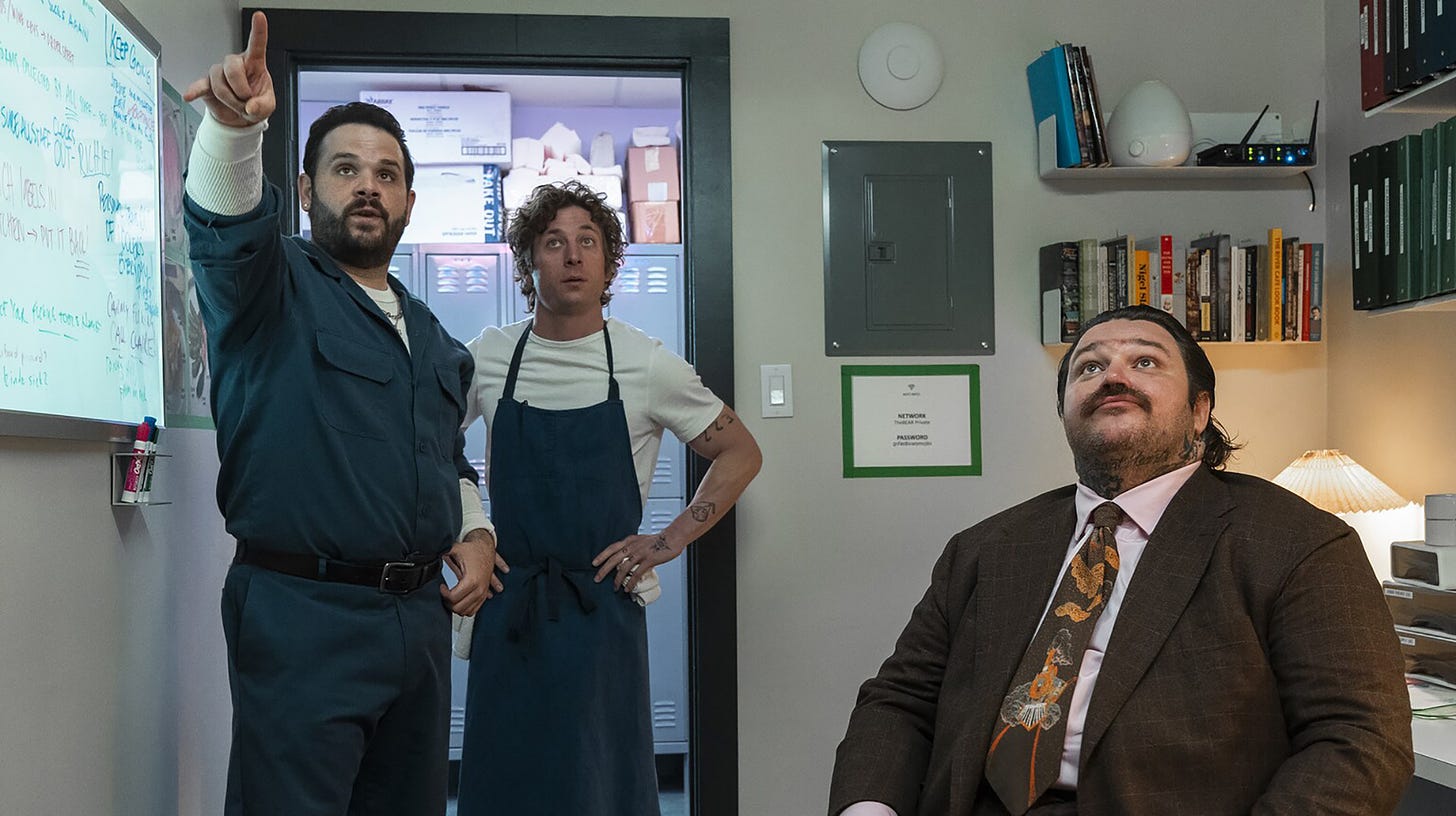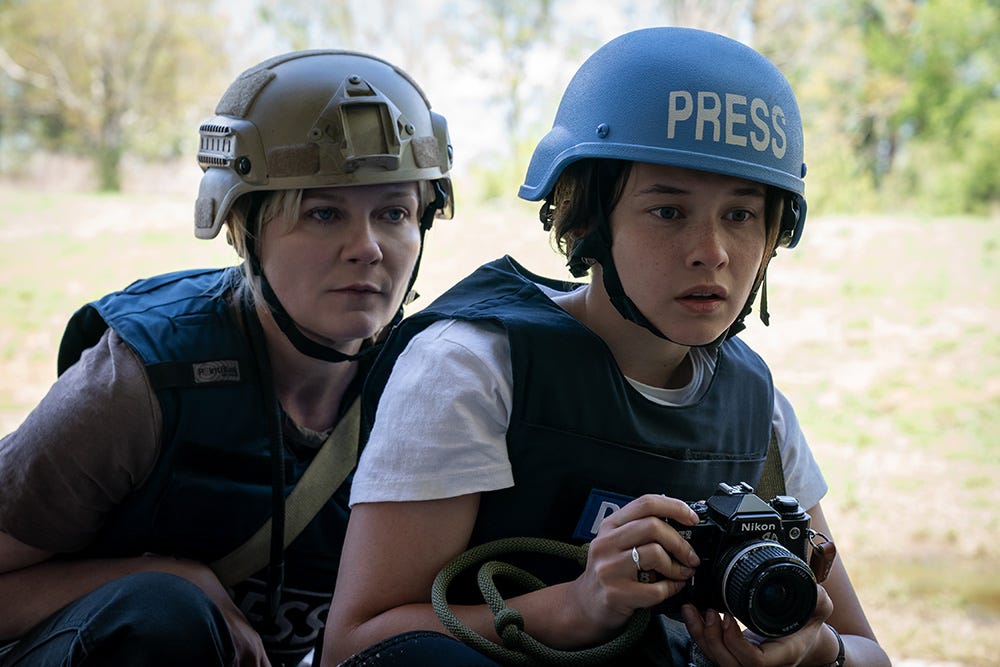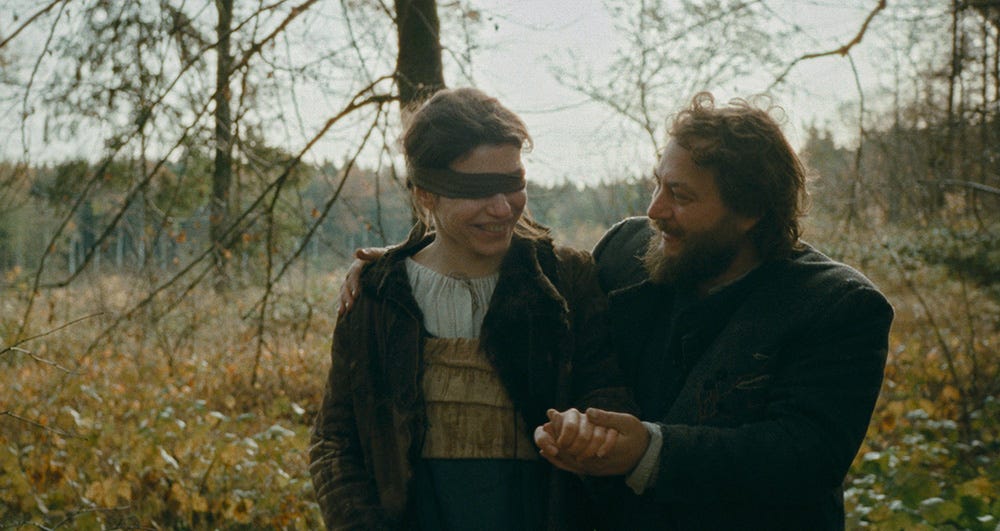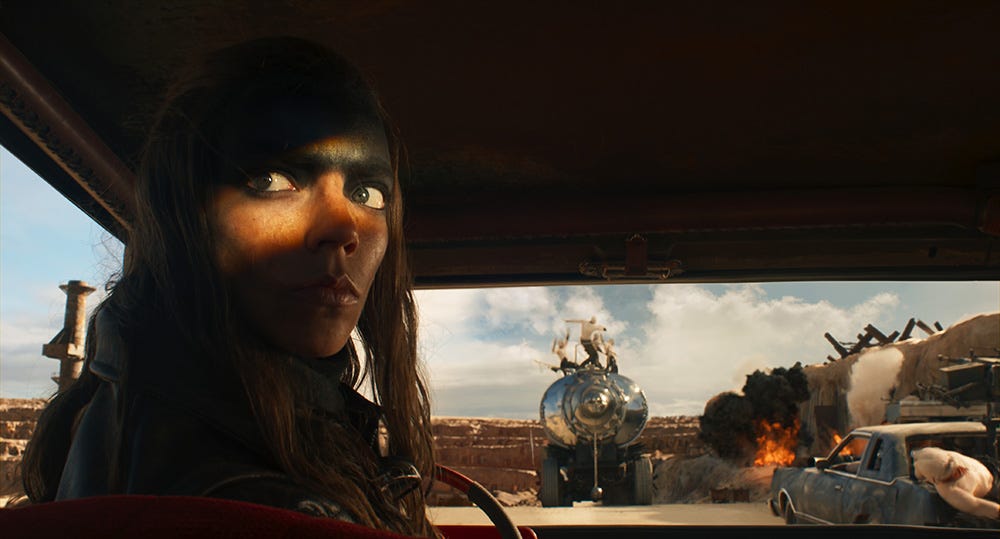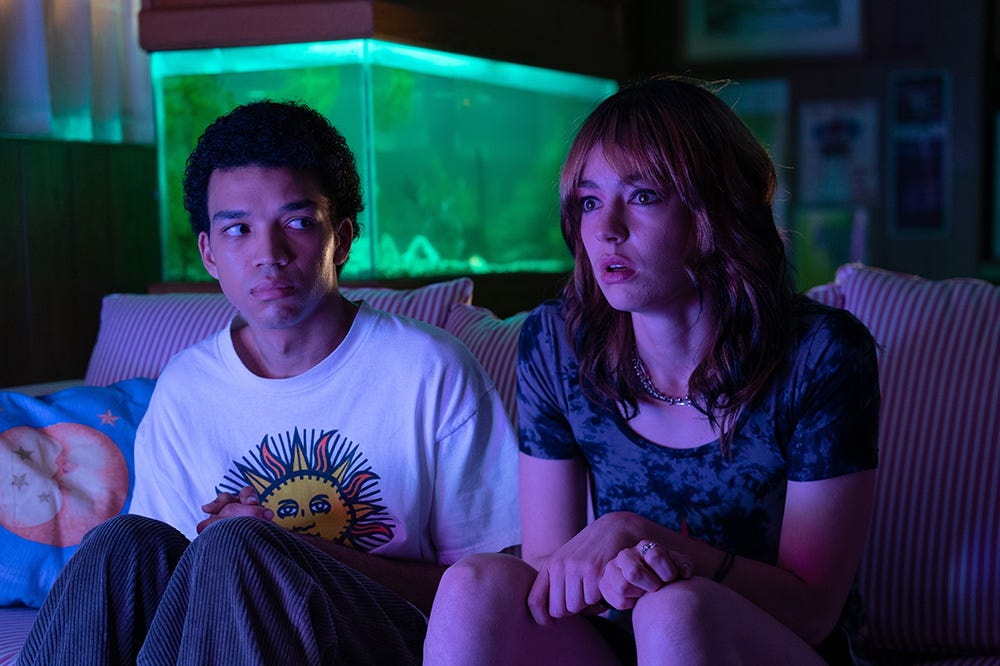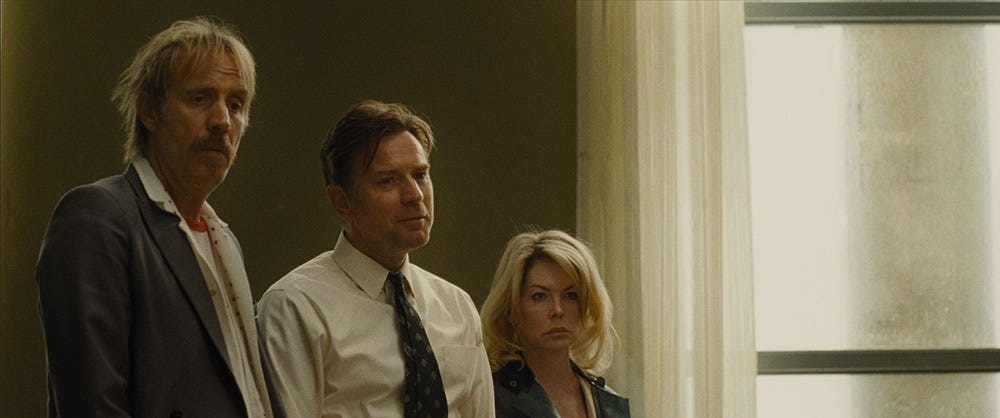July means one thing: Midpoint Year Film Lists.
This is a lot harder to do when you haven’t gone to the movie theater at all. I tried my best to keep up at home, but definitely had to crunch a bit to get the big titles watched before filing tonight. Thank you to the super short windows between theatrical and VOD!
I think the only glaring omissions are THE BIKERIDERS and LA CHIMERA. Maybe INSIDE OUT 2? I don’t think I’m going to care too much about THE FALL GUY or HORIZON, but people are talking about them a lot.
Here’s my list so far:
I SAW THE TV GLOW
AUS MEINER HAUT [SKIN DEEP]
GHOSTLIGHT
LAAPATAA LADIES [LOST LADIES]
THE KING TIDE
CIVIL WAR
LOVE LIES BLEEDING
SUNCOAST
HOW TO HAVE SEX
DOMAKINSTVO ZA POCETNICI [HOUSEKEEPING FOR BEGINNERS]
What I Watched:
THE BEAR: Season 3
(streaming on Hulu)
From an eight-episode season to a ten-episode season to a … twenty-episode season?! That’s the trajectory that Christopher Storer’s THE BEAR seems to have taken and we can’t really judge whether it will prove the correct one until Season Four drops to finish the story threads begun in Season Three. Is that bad? Not necessarily. But it is problematic. Because while the payoff might prove masterful tomorrow, we’re left hanging today with what can only be described as a missed opportunity even if it could also be labeled as a welcome change of pace.
I say that because I did really like what Season Three had to offer. The slower pace. The lack of a central purpose beyond letting the characters breathe (and implode). The abundance of emotional montages that utilize an actual score (even if it’s composed by an artist in Trent Reznor who also had a song, via Nine Inch Nails, playing in a previous season) while flipping through scenes we’ve seen before and others that help infer upon progressions and psychology. This is a season of vibes—even if those vibes are born from incessant screaming—rather than plot. “Tomorrow” is as much a recap as it is a season premiere.
And that’s great. Especially with the theme of “legacy” running through the background from start to finish. I loved “Napkins” and its look into how Tina (Liza Colón-Zayas) got here. I love the stuff with Marcus (Lionel Boyce) dealing with the death of his mother—even if it kind of allows the writers to gloss over the potential romance/rejection with Sydney (Ayo Edebiri). Sweeps (Corey Hendrix) doesn’t get his own episode like so many characters did in Season Two, but his role evolves here. Same with Ebraheim (Edwin Lee Gibson). It’s also great to watch the growth of Sugar (Abby Elliott) and Richie’s (Ebon Moss-Bachrach) dynamic after the latter’s transformation from arrested development to adult.
As for Carmy (Jeremy Allen White) and Sydney themselves, though? It’s a full plateau. He can’t get out of his head and she can’t hold him accountable. He tortures himself with what he said to Claire (Molly Gordon) in the last finale and she finds herself wrestling with whether to stay with the dysfunctional family she’s grown to love or advance her career in a way that may turn her into a Carmy if she’s not careful. So, we wait for the proverbial shoe to drop, assuming it will come every episode post-“Children” because it must, right? Unless this isn’t a self-contained season. Unless it ends with a “to be continued.”
Now I wonder what a re-watch with that knowledge might bring. If I know there won’t be any closure to anything that goes on here—not to Carmy and Claire, not to Sydney’s decision, not to the tension between Carmy and Richie that also stems from the last finale—will it hit differently? Maybe. I will, however, say that I’m not going to try and find out because I simply don’t have the time to watch incomplete narratives anymore. I will re-watch Season Three when Season Four is ready to drop so that I can experience the full scope of what Storer and company are doing.
Because without that closure, all I can see when looking back now is that missed potential. The repetition of the emotional beats spanning multiple episodes to stretch things out over ten episodes despite ten more coming and the, frankly, unsuccessful decision to expand the Faks’ role to help fill the gaps too. Matty Matheson’s Neil is one of my favorite characters in the show precisely because he’s so unlike anyone else on-screen. Introducing his brother Ted (Ricky Staffieri) in Season Two was okay because it added depth in a very small dose. Making him a regular in Season Three? Too much.
Between Ted’s presence turning Neil from a change of pace to a punchline and even more Faks via a weird, silly scene with an uncle and the most glaringly bad bit of stunt casting I’ve ever seen with the show’s wildest cameo yet, we receive a perfect example of why less is always more. Stick to fun chaos like Sugar’s vendetta against Francine Fak without ever showing Francine Fak. Because the more we see the Faks, the more they become annoying rather than endearing. The more we hear Neil talk about being Carmy’s best friend, the more it becomes pathetic rather than sweet.
It happens, though. When you have a success like THE BEAR, you find the desire to go bigger. Thankfully, the show and the characters are so great that they can sustain a misstep in scope and keep us invested even if we might be growing tired of Carmy’s refusal for self-reflection (the obvious montage of what he’s thinking in “Forever” maybe, finally getting him to realize he’s become as bad as Joel McHale’s Chef David is way too many episodes too late) and Sydney’s refusal to push him like he says he wants her to. This whole season is Storer telling us what we’re supposed to see in the main plot despite already showing it during the previous two. Nothing is added on that front.
I only hope Season Four’s apparent conclusion to this first act will satisfy and not let the good character work on behalf of the supporting cast go to waste. Because watching Richie and Carmy scream at each other devoid of nuance and Carmy step over every word that comes out of Sydney’s mouth without push back isn’t interesting. Richie engaging with his daughter is. Marcus coping with the loss of his mother is. Tina struggling to help support her family is. Sugar getting a chance to speak her truth to Donna (Jamie Lee Curtis) in the very good “Ice Chips” is.
Whereas Storer has been fantastic at letting the plot run through character development during Seasons One and Two, he’s lost in a disconnect here. Those aspects are operating individually in a way that shows how superior the latter is to the former. That was always okay because they went hand-in-hand. The moment you lose the synergy, however, is the moment you realize you don’t really care about the restaurant at all. (Sorry, Uncle Jimmy.) I’m about ready to wish The Bear will die so these amazing people can shine somewhere else. Who knows? Maybe that’s the point. Guess we’ll find out next year.
- 7/10
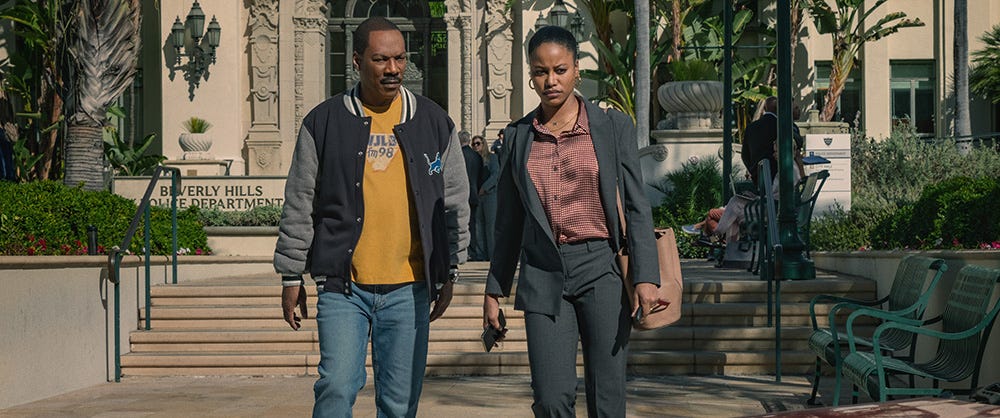
BEVERLY HILLS COP: AXEL F
(streaming on Netflix)
I know cinematic rights issues are a pain, but I’m going to believe that Netflix intentionally decided to not let BEVERLY HILLS COP III onto its platform despite having the original and Part II ready to stream in the lead-up to the long-awaited BEVERLY HILLS COP: AXEL F. I love thinking that even they knew having a turkey like that playable for their audience would actually make people want to watch the latest installment less than they might already considering the tenuous reception of “remakes and re-quels” these days. Don’t chance giving them that bad taste even if lower expectations can sometimes prove a successful marketing ploy.
I did watch it, though. I had never seen either sequel before, so I figured I would do my due diligence before diving into Mark Molly and screenwriter Will Beall’s rejuvenation (Beall shares writing credit with Tom Gormican and Kevin Etten, but maintains sole “story” credit). Did it leave a bad taste in my mouth? Sure. So did the fact Eddie Murphy let John Landis direct it despite knowing about and verbally calling out, on-the-record, his complicity in the TWILIGHT ZONE: THE MOVIE deaths. He also very publicly stated post-Part II that him acting in a Part III would only ever mean one thing: he needed the money.
That’s not the case this time. Murphy has had a bit of a renaissance on streamers with the likes of DOLEMITE IS MY NAME (Netflix) and COMING 2 AMERICA (Prime), so money isn’t an issue. No, this one seems personal with him saying that he wanted to make-up for Part III being so bad. It took a while. Many writers, plot lines, and directors too, but he’s finally back in his Detroit Lions jacket to fly cross-country and help out a friend. Because Axel Foley (Murphy) would have ditched Jeffrey (Paul Reiser) in the Motor City to save Billy Rosewood (Judge Reinhold) on his own if needed. He just also had some added incentive upon discovering his estranged daughter (Taylour Paige’s Jane) was in danger too.
Similarities abound where this one concerns the first film—straight down to an almost complete recreation of the soundtrack—but connecting the crime from its cold open to the story’s central case isn’t one of them. No, this crime is all Beverly Hills homicide with a cop in the ground and a cartel member behind bars. Except Billy doesn’t think the kid is guilty. He believes it’s all a set-up and calls Jane (a California defense attorney) to defend him. Accepting the case ultimately puts her in the bad guys’ crosshairs and gets Billy kidnapped. Luckily, Axel is already on his way to cause a ruckus before getting himself arrested minutes after landing.
90210’s wealthy police department has evolved yet again with after so many decades passed—except for Taggart (John Ashton) returning post-retirement in Part III. Captain Grant (Kevin Bacon) is all fancy suits and Detective Abbott (Joseph Gordon-Levitt) is all fancy words. It’s a new world order that Axel surely won’t abide by en route to saving the day after ruining a few along the way. There’s a case to crack, a friend to find, and a daughter with whom to reconnect. And the first two points are easy by comparison since the third is thankfully written in a believably complex manner that refuses to exonerate Axel for being a bad dad.
His and Jane’s dynamic isn’t merely a means for added and authentic drama, though. It’s also the main catalyst for most of the best comedy. Finally, someone is quick enough and witty enough to make Axel shut-up. The tables have turned and he doesn’t simply raise his defenses to retaliate. He considers her words and acknowledges his flaws to at least earn the chance for forgiveness if she’s willing to provide it (although the help from Abbott, who just happens to have had similar parental issues, proves a bit much). It helps that they also work well together when conning unsuspecting marks along the evidence trail.
Serge (Bronson Pinchot) is back for a brief cameo (and GTFO catch phrase), but the majority of callbacks are story beats for mimicking and subversion so the final film can be as much an effective re-quel as it is a worthy sequel. The action scenes are fun with a ton of property damage (thanks in part to off-the-wall vehicles like a snowplow, meter maid cart, and helicopter). The Detroit Red Wings and Vegas Golden Knights get screen time at Little Caesars Arena, Maureen Taggart finally makes an appearance, and Reinhold and Ashton get to take it easy while Gordon-Levitt runs around (although Murphy and Bacon keep up with him despite not being much younger than those stalwarts).
Is it a cable movie relegated to a streamer for rainy night enjoyment? Yes. So too is the rest of the franchise in 2024. Martin Brest and Tony Scott’s entries made money on the big screen and had big screen productions in the 1980s, but I don’t think anyone expected AXEL F to somehow scale up accordingly to look like MISSION: IMPOSSIBLE. Molloy, Murphy, and the rest of them knew what this was and accomplished what they set out to do. They brought the character into the 2020s, supplied him a worthy verbal combatant in Paige’s scene-stealing Jane, and crafted a sufficiently tense (if tired with the whole “cops get no respect so they must take it by going dirty” sentiments) crime to foil. That’s honestly all we needed.
- 6/10
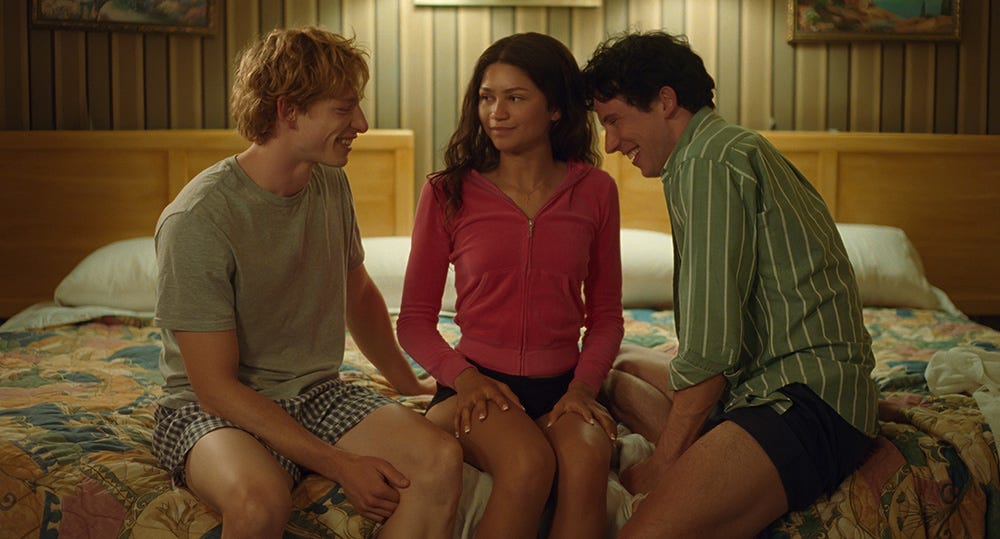
CHALLENGERS
(VOD/Digital HD)
I thought I was being punked when Patrick Zweig (Josh O'Connor) starts to serve at the beginning of Luca Guadagnino’s CHALLENGERS. He lifts his racket behind his head before tossing the ball and no one is laughing in the stands? Art Donaldson (Mike Faist) should be so distracted by the sheer lunacy of what he’s seeing that he can’t attempt to return it. Yet the scene simply moves along as though nothing is amiss. It simply pretends that someone could actually get past high school tennis without having that idiosyncrasy beaten out of them. And then Justin Kuritzkes’ script tells us that Patrick went to a private tennis boarding school?! It must be a joke.
The fact that this serve is a crucial plot point for which the climax hinges upon should make me hate the finished product and yet I must admit I truly enjoyed myself once I got on its level. Kuritzkes and Guadagnino are leaning into the absurdity of the situation, letting chaos reign so we can sit back and eat our popcorn as the mess unfolds on-screen. None of this is serious. None of it makes sense. Not as a sports movie and not as a romantic throuple worth investing in beyond watching them wryly smile when stabbing each other in the back. CHALLENGERS is soap-y melodrama spanning over a decade to reveal its One True Pairing was always Tashi Donaldson (Zendaya) and tennis itself.
Not that this comes as a surprise. As soon as she admits to these boys—both of whom can’t stop drooling for a second to really listen—that her love affair has always been with the sport, we should be keenly aware of where this will all lead. Tashi is so smitten with tennis that she can only allow fifteen seconds of her latest match to even be called by its name. It’s why her flirtations with “Fire and Ice” prove so manipulative as opposed to sexy. She doesn’t want either of them. She’ll use them if they let her. For sex? Sure. But their real purpose is as raw material to mold for her true beau. Art and Patrick have the goods to serve tennis if they’re willing to give themselves to its beauty like she has.
This is why it’s somewhat difficult to get into the movie at first. It all feels fake with stilted dialogue and over-the-top, cartoonish action until you are able to vibe with its real intentions. There’s this veneer of superficiality wherein the actors are being made to play roles as written despite them being nowhere near authentic depictions of human beings. Its heightened emotional warfare is in service of an otherwise shallow narrative because the plot is secondary. Heck, it’s less than secondary. We just don’t know it yet because the characters are so one-dimensional.
I did always love the structure of it, though. Everything plays as flashbacks against the backdrop of a “challenger” event—the sort of minor league circuit tournament that those who aren’t good enough to be gifted a ticket to the Grand Slams play as a means of qualifying for the qualifiers. Patrick is there because he’s never been able to check his ego and let the sport take control. Art is there because he’s lost his drive to keep letting it. Tashi, the latter’s coach/wife and the former’s ex-girlfriend, forces Art to play in the hopes easy competition will give him his confidence back. Unfortunately, Patrick, his estranged BFF and ex-doubles partner, is undefeated against him.
That’s when it gets good. Namely because of Josh O'Connor. Whether it’s that he’s by far the best actor of the trio or Kuritzkes was just able to write one of his characters light-years better than the others, I don’t know. Whatever the reason, the moment Patrick tells Tashi to fuck off after she plants the seed to be for him in the past what we’ve already discovered she’s become for Art in the present (or, perhaps it’s better described as planting the seed for him to become what Art always was—a doormat), is the moment I sat up straight. Finally, some teeth are bared. Finally, we see what it is she sees in him despite Art being everything she needs to satisfy the tennis Gods. Finally, we see why Art lost his personality the moment Patrick went away.
The rest of the film gains life in the aftermath and the head games being played all find a second layer as a result. The tennis is still laughable (Guadagnino shoots it in a way to feign exhilaration despite the actors moving and swinging like the tennis ball was added in post—and don’t get me started about the “ball cam” and “chest cam” moments at the end) and the characters still pawns to a script that loves to wink at itself, but O’Connor’s transformation into a trickster spoiler provides the suspense and allure necessary to invest anyway. Because what angle is he really playing? Is he trying to destroy Art and Tashi’s love? Or is he trying to wake them both up from the doldrums that love ultimately wrought?
- 8/10
CIVIL WAR
(VOD/Digital HD)
“[My dad is] sitting on his farm in Missouri pretending like none of this is happening.”
There’s truly no more damning line throughout Alex Garland’s very good CIVIL WAR than that … except maybe when Lee (Kirsten Dunst) tells Jessie (Cailee Spaeny) her parents are doing the same in Colorado. Not because it holds either character up as a hero for refusing to put on blinders. Not because it prejudges those who steer clear of the fight as being cowards either. It’s simply because the state of society in the twenty-first century has demanded that we become numb in order to survive.
Technology didn’t flatten the world and bring us together with shared empathy for our fellow man. No, it divided us further. It allowed us to point fingers and call names with a louder megaphone. To misconstrue visuals of cultural events and traditions from foreign places as being antithetical to our own rather than of parallel importance. It gave evil and chaos a platform to brainwash and rally tribes of armed sheep ready to kill anyone they deem inferior because they believe doing so will somehow earn them a reward that never comes.
It’s why Garland can only tell this story through the eyes of the most objective participant possible: journalists. That doesn’t mean they are objective. There’s a reason they fear driving through states still loyal to the American government’s president (Nick Offerman) and why they can embed themselves with Western Front rebel forces. Those who miss the point (conservatives) will say that it’s because the mainstream media is liberal and thus aligned with “the liberal enemy.” But reality proves it’s the fact that truth—the thing real journalists seek to uncover and disseminate—often sides with the oppressed.
Is the result therefore political? You bet. Not in the sense that it picks a side beyond the implicit need to show a victor by following the usual blueprint for these types of citizens vs. authority conflicts, but because it dares to reveal that truth. Sammy (Stephen McKinley Henderson) isn’t lying when he tells Lee and Joel (Wagner Moura) that the media is considered the enemy by the White House. They are the ones showing the people what it is the president and his government are doing. They shed the light on the injustices that he and his followers lie about and say aren’t happening. If it weren’t for them, maybe the Western Front never realizes it has the numbers and power to secede.
As for the more superficial nature of Garland’s script, I’d compare its genre and tone to the PURGE series before I would a war movie. The way he puts “good” people on the road to survive uncertain and unchecked carnage is pretty much the same besides there being less gory violence and a much longer time period with which to be afraid. Lee and company find themselves in war zones, towns shrouded beneath a veneer of peace, hostile territory with wild cards protecting their property from whomever dares to trespass, and militiamen (Jesse Plemons) taking matters into their own hands.
There’s some great suspense and a perpetual sense of looming terror. Characters we learn to love die en route and others find themselves staring down the barrel of a gun, if not pulling the trigger (figuratively speaking). And in the end it all comes down to the mindset that this danger and the consequences risked are worth it. That if one of them falls, another will take their place so the truth won’t be expunged. It doesn’t mean you must be callous (as Lee likes to pretend she is). It just means you must be ready for whatever happens because the people need to know regardless of whether they ever remember it was you who died to tell them.
- 8/10
THE DEVIL’S BATH
[Des Teufels Bad]
(streaming on Shudder)
It’s not until a man commits suicide halfway through Severin Fiala and Veronika Franz’s THE DEVIL’S BATH that we truly understand what it is we witnessed in the opening scene. What first appears to be a woman lost in darkness who throws her baby over a waterfall before confessing and being beheaded suddenly takes on additional context when a man who takes his own life is refused burial and thus rendered a “lost soul.” Unlike him, the woman was given the opportunity to confess her sins and be absolved en route to Heaven. By killing her child to achieve suicide by proxy, she saved her soul.
This “loophole” was used often in the 1800s with approximately four hundred known cases dealing with women murdering children in Germanic regions alone according to research conducted by Kathy Stuart. It’s her findings that inspired Fiala and Franz to write the film—one that was originally planned as a courtroom drama due to there being concrete first-hand, written accounts of what these women said drove them to commit their crimes. Instead of a stale film with characters talking for two hours, however, the filmmakers decided to pivot to a more personal depiction of one woman’s heartbreaking descent into madness.
Agnes (Anja Plaschg) wasn’t a depressive before her wedding. She was happy, in love with Wolf (David Scheid), and desperate to be a mother. So invested in getting pregnant, she even partakes in what appear to be pagan prayers with severed fingers and a bag of curios meant to help her conceive. But everything changes that first night when Wolf stumbles in drunk. He refuses sex, depriving her of her main purpose—something he continues to do many times afterwards. Stuck without a child to raise, Agnes is forced to endure the judgment of her mother-in-law (Maria Hofstätter). Failing to become a mother, she’s made to believe she’s also failed to become a good wife.
The film progresses as a gradually escalating series of self-destructive acts. Dark thoughts and self-loathing creep in to make Agnes lose time in melancholy due to nothing going right. She becomes trapped in the psychological turmoil while we see what’s happening through a modern lens. Like Wolf always getting close to other men when drunk. Or Wolf’s mother constantly trying to force her wants and desires upon Agnes. Or the archaic religious imperatives that feed a self-sustaining cycle of violence helped by an even more archaic system of health care. This is a world built to neglect those who need the most care. One that leaves them to choose between impossible extremes so appearances can remain unimpeachable.
There are some really memorable sequences that arrive once Agnes starts to lose her grip on reality. Nothing is strictly horror per se, but the psychological and emotional toll definitely creates an air of anxious uncertainty. A good portion of that is also conjured through Plaschg’s performance. Here is a woman running towards a cliff with the best of intentions who discovers many would rather throw her off then lend a hand. She’s told to be pious yet chastised for praying too often. She’s told to be a mother yet is unable through no fault of her own. She’s judged and chastised and resented to the point of full dissociation. A point where the only escape is on their terms. Where release ultimately feeds their bloodlust for more.
- 7/10
FURIOSA: A MAD MAX SAGA
(VOD/Digital HD)
Furiosa (Anya Taylor-Joy) lives. We know this because George Miller’s return to the Wasteland, FURIOSA: A MAD MAX SAGA, is a prequel to his Oscar-nominated masterpiece MAD MAX: FURY ROAD. The stakes surrounding her survival are therefore non-existent. So, Miller and co-writer Nick Lathouris must find a different hook. And considering we know Furiosa was taken from the “Green Place” as a child and desperate to return, said hook arrives via the obvious question: Who took her?
It cannot be Immortan Joe (played by Lachy Hulme due to Hugh Keays-Byrne’s death in 2020). Furiosa wouldn’t have stayed at The Citadel as long as she had if he was the man responsible for ruining her childhood. It must be someone else. Someone who would ultimately bring her to Joe and set off the series of events that led her to helping emancipate his “wives.” And if Taylor-Joy is going to play the role with a similarly severe stoicism as Charlize Theron, we need a character with a contrast of crazed insanity. Enter Dementus (Chris Hemsworth), a villain worthy of a vendetta great enough to bring kingdoms crumbling down.
The film is thus simple in construction. Furiosa is kidnapped to serve under Dementus’ wing because he wants nothing more than to rule with bountiful glory—something he can achieve if she’s willing to tell him where she’s from so he can conquer it. And if she refuses, well, he’ll seek to acquire the next best thing: The Citadel. Except, of course, that his crazy is no match for actual strategy. Immortan Joe will not let his kingdom be stolen and, if you’ve been paying attention, there’s no better way to get in his good graces enough to steal his “wives” then to ensure it doesn’t. So, Dementus throws his grenade into the Wasteland ecosystem, Joe looks to save it from him, and Furiosa seeks retribution.
Praetorian Jack (Tom Burke) and History Man (George Shevtsov) are also involved—more for exposition than true narrative propulsion. The former is a means for which Furiosa can escape her chains yet remain working at her prison while the latter presents a welcome voice of reason amidst the chaos. They add to the flavor of what Miller has wrought even if neither earns enough screen-time or purpose beyond steppingstones for Furiosa’s ascension to matter. More bodies to be used and/or sacrificed. Similar to the many acolytes surrounding Dementus. They’re gross, entertaining, and ready to die.
I will say this about those cronies, however. If you have the impulse to let actors play multiple roles (Hulme also plays Rizzdale Pell, Dementus’ right-hand man), don’t do it as obviously as with Elsa Pataky. Whereas one of Hulme’s characters has his face covered below the eyes, both of Pataky’s are clearly visible despite some gruesome prosthetics. And since her first role (Vuvalini General) is a protector of the “Green Place,” watching her “infiltrate” Dementus’ gang shortly after had me assuming heroics were on the horizon. Except they weren’t. Mr. Norton (her other role) is just a henchman. So, hire someone else for one of them?
But I digress. Where the revenge tale of Furiosa surviving to escape and then surviving to kill is concerned, FURIOSA is very good. Perhaps a bit overlong with a not-quite love story trying to justify a good chunk of that runtime when its inclusion is really just to get her behind the war-rig’s wheel and somewhat shallow in the fact that the politics of the situation are flimsy at best to hold her trajectory up, the action and production remain top-notch. It’s not as memorable as FURY ROAD, but it’s a welcome expansion upon its lore, nonetheless. Because despite re-watching that 2015 film before pressing play on this one, FURIOSA’s greatest success is making me want to watch FURY ROAD again.
- 7/10
I SAW THE TV GLOW
(VOD/Digital HD)
What is “The Pink Opaque”? Twelve-year-old Owen’s (Ian Foreman) interest is piqued whenever he catches the commercials for this strange television show that caps off the Young Adult Network’s Saturday night programming, but he never dares to wonder since he’ll never be able to watch it. Bedtime is 10:00. The show airs at 10:30. His mother (Danielle Deadwyler) would let him stay up, but it’s not her call to make. If Owen desires anything, it’s his father (Fred Durst) who decides. And since the answer is almost invariably “No,” he’s stopped asking. The best shot he has to do anything is if Mom asks on his behalf.
That all changes on election day 1996. While waiting for his mother to finish commiserating with the other adults, Owen stumbles upon an older student reading a “definitive episode guide” of the show. The simple fact that he’s heard of it is what finally gets Maddy’s (Brigette Lundy-Paine) attention, even if his admission of only seeing the commercials quickly erases her enthusiasm. Owen does wish he could watch it, though. And, being that it’s such a seminal part of Maddy’s existence, she can’t help but offer an avenue to help him. “The Pink Opaque” soon provides them a secret society of two—an escape from their struggles through fiction, fantasy, and the supernatural.
Writer/director Jane Schoenbrun’s inspirations for this show are obvious. Think “Buffy the Vampire Slayer” through the warped filter of David Lynch if “Twin Peaks” the show took on the more hellish tone of FIRE WALK WITH ME. (I still maintain that “The Return” isn’t really “Twin Peaks” at all.) Its inclusion in I SAW THE TV GLOW isn’t solely about aesthetic or nostalgia, though. Its purpose is much more personal than that. Because despite not quite knowing it at the time, Schoenbrun talks about using shows like “Buffy” as a way to dissociate from her life. Only after transitioning has she looked back and seen how that fiction and her fandom allowed her to leave reality behind and find her true self on the other side of the screen.
There are so many nods to this being a coming out film with a pointedly trans lens whether obvious (Dad chastising Owen’s interest in “The Pink Opaque” by calling it a “girls’ show”) or subtle (an older Owen, now played by Justice Smith, narrating his life to the camera as though he is outside himself). And then there’s the idea that he is actually one of the characters in the show named Isabel (Helena Howard). Because just like Schoenbrun wielded television as a means of leaving her body, the film asks both Owen and Maddy to literally do the same on-screen. It posits the question that maybe the two of them didn’t just watch “The Pink Opaque,” but that they remembered it. That they are Isabel and Tara (Lindsey Jordan) trapped in the Midnight Realm by Mr. Melancholy’s (Emma Portner) man in the moon.
Schoenbrun uses I SAW THE TV GLOW’s supernatural horror underpinnings centered on a teenager trapped inside an invisible prison built to keep him from discovering the truth as a way to deliver her devastating coming-out tale to a mainstream audience. Because Owen’s fear in believing and terror towards leaving “reality” behind isn’t fantasy. His reality is a lie that society has been built to maintain so that he can never become his true self. The narrating. The idea that time is passing like years in seconds to the point of feeling like death is always on the horizon despite everyone else looking the same. It’s all physical manifestations of what closeted queer kids deal with in their minds as they attempt to exist in a world that isn’t quite right.
And if you thought WE’RE ALL GOING TO THE WORLD’S FAIR was evidence of a formally talented filmmaker creating haunting imagery that will stick with you long after the credits end, Schoenbrun has somehow leveled up to the point of making that low budget darling seem quaint by comparison. The monster-of-the-weeks in “THE PINK OPAQUE” are only the tip of the iceberg too. There’s a scene where a character is desperately trying to enter their television screen with sparks flying and screams blaring that might just prove to be the most unforgettable cinematic moment of the year. Add a killer soundtrack and brilliant 90s-era production design and there are zero flaws to be found.
No matter how good it looks or how inventive the script is at bringing its metaphor to life, though, it still needs Smith and Lundy-Paine to deliver the goods. Her Maddy is guarded to the point of being cold with Owen, but only because she’s been burned countless times before. Once she can trust that his interest in her and the show is authentic, she opens up without fully losing the awkward sense of uncertainty that comes with being somewhere she doesn’t belong. And his Owen—soft-spoken and downtrodden—comes alive when he’s watching the television. Not in some over-the-top comical way. Just via a wide-eyed wonder and excitement towards the possibilities that await him if he’s willing to jump into the abyss.
And just because the film seems destined to be one full of regret, don’t ignore the power of the words “There is still time” that grace the screen as chalk on asphalt. Maybe he’s not ready to escape the sense of dysphoria that eats away at him right now. Maybe he won’t be later either. But there’s still time. Even when the memories of vividly nightmarish adventures on the other side of the TV screen fade to reveal shoddy craftsmanship and corny dialogue, there’s still time. Even when the existential dread brought on by the boring lives of boring people living as though they cannot see the cracks in reality are about to explode, there’s still time. There’s still time to dig yourself out of the ground and be reborn.
- 10/10
MOTHER, COUCH
(limited release)
The obvious comparison points for Niclas Larsson’s MOTHER, COUCH (loosely adapted from Jerker Virdborg’s Mamma I Soffa) are Charlie Kaufman’s SYNECDOCHE, NEW YORK and I’M THINKING OF ENDING THINGS. It has that same sense of existential dread manifested by absurdly surreal scenarios that bleed the line between reality and imagination through the filter of a lead character’s chaotic psychology. And just because it can’t quite live up to the expectations that parallel may present doesn’t mean it doesn’t succeed in its own way to present a sort of litmus test for the viewer. Maybe you understand the emotional turmoil on-screen from experience. Maybe you don’t.
David (Ewan McGregor) is the focal point. A married father of two, his life is in a bit of a shambles. People think his marriage (to Lake Bell’s Anne) is on the rocks—he apparently does too considering his defensiveness whenever she brings up the father of their kid’s friend—and he thinks it’s his job to take care of his mother (Ellen Burstyn) because his half-siblings (David, Rhys Ifans’ Gruffudd, and Lara Flynn Boyle’s Linda all have different fathers) can’t be bothered. He doesn’t necessarily blame them since their mother was never really a good person. What he can’t forgive, however, is that they’ve distanced themselves from him too, seemingly because he stayed close to her.
So, here they all are under the same roof for the first time in what seems like forever. It’s not any of their roofs, though. It’s within the confines of a vintage furniture store about to close its doors after thirty years. Owned by Marco and Marcus (F. Murray Abraham) and currently under the former’s daughter’s (Taylor Russell’s Bella) care, David and company arrive in search of a dresser … or so it appears. In truth, their mother doesn’t seem to be looking for a dresser at all despite constantly speaking about one. It looks like she wants a couch instead. Or, better stated, she has found a couch upon which she refuses to leave. She doesn’t want it brought home. She wants to stay on it here.
You can start to figure out what it is we’re watching isn’t exactly what is happening. Why won’t she leave and why can’t David let her stay? The answer is simple for those who’ve lost a parent—regardless of whether their relationship with said parent was good or bad. Inklings are sprinkled in through dialogue (Gruffudd and Linda telling David they’ve come to help him, not her) and actions (Marco laying out some exposition to give this establishment, Oakbed’s Furniture, a purgatorial air). Events occur that show just how much like his mother David is and truths are told to remind him just how much she’s ruined. Will he finally abandon her? Will he stay like always? Will he simply learn to let go?
I love the idea that Larsson jumped off from Virdborg’s book rather than tying himself to a strict adaptation. He says he asked the author how much latitude he was allowed only to have Virborg state he could steal whatever he wanted and make it his own. Then there’s a story that the filmmaker broke down the truth of what was happening in each scene to the crew—without letting the cast know—so that they could anticipate the purpose of everything while the actors would conversely react in the moment. Because there is a lot going on. Storms rage outside the windows as though the building is a ship on the ocean. Blood is spilled literally and figuratively with a letter knife. Characters obfuscate as a rule.
And it’s all for David’s benefit … and torture. It’s all to keep him off-balance as he traverses his own delicate psyche when it comes to past, present, and future as well as nature vs nurture. Which of his wants and desires are real and which are conditioned? Does his dream of having a relationship with his siblings better contextualize why he remains close to his mother or is that closeness a form of self-sabotage to ensure he never will? Is David’s inability to be there for his kids a result of how his mother treated him or does he stay away so he won’t do the same and thus finds himself locked in a self-fulfilling prophecy? He’s working through his trauma and the complex feelings that bind his love and hate for the only parent he has ever known.
McGregor is fantastic in the role. The rest of the cast is great too (Russell and Burstyn are standouts), but this whole thing lives and/or dies by what his David does. It’s not a choice between Mom and everyone else either. It’s one that pits her against him. Can he put himself first for once? Can he break the bond that she has cultivated (despite blaming him for being clingy) to stop blaming everyone else for his sadness and actually fight to be a part of their lives? Whether the answers to those questions are enough to render MOTHER, COUCH a success is up to you. Because while I think it’s all there on the screen, I won’t deny that Larsson might keep things a bit too esoteric at times. He wants us to fill in the blanks. How does this story relate to our life? Its power demands our participation.
- 7/10
Cinematic F-Bombs:
This week saw A FAMILY AFFAIR (2024) added to the archive (cinematicfbombs.com). I’ve had text-only f-bombs before, but this is the first electronically-voiced f-bomb included in the collection.
Text-to-speech f-bomb in A FAMILY AFFAIR.
New Releases This Week:
(Review links where applicable)
Opening Buffalo-area theaters 7/3-5/24 -
DESPICABLE ME 4 at Dipson McKinley, Flix & Capitol; AMC Maple Ridge & Market Arcade; Regal Elmwood, Transit, Galleria & Quaker
KILL at Dipson Capitol; Regal Elmwood, Transit, Galleria & Quaker
“Just let the rage unleash in whatever convenient way is necessary to get the blood flowing faster. What's good enough for JOHN WICK should be good enough for KILL, so wake the boogeyman up and let him loose.” – Full thoughts at The Film Stage.
MAXXXINE at Dipson Capitol; AMC Maple Ridge & Market Arcade; Regal Elmwood, Transit, Galleria & Quaker
ROBOT DREAMS at North Park Theatre (select times)
Brief thoughts via Letterboxd.
SOUND OF HOPE: THE STORY OF POSSUM TROT at Dipson Amherst & Capitol; AMC Maple Ridge; Regal Elmwood, Transit, Galleria & Quaker
Streaming from 7/5/24 -
GOYO – Netflix on 7/5
THE IMAGINARY – Netflix on 7/5
QUAD GODS – Max on 7/10
WILD WILD PUNJAB – Netflix on 7/10
DIVORCE IN THE BLACK – Prime on 7/11
VANISHED INTO THE NIGHT – Netflix on 7/11
Now on VOD/Digital HD -
BABES (7/2)
“A lot of [its] success is due to Buteau delivering an authentic and natural performance that’s as funny as it is resonant.” – Full thoughts at HHYS.
BONEYARD (7/2)
CHICKEN FOR LINDA! (7/2)
“It's a wonderful message told with a bottomless wealth of entertainment and gorgeous animation. Add a couple songs making it a quasi-musical and CHICKEN FOR LINDA! proves a compact, lightning-paced and resonant lark.” – Full thoughts at HHYS.
COLD BLOWS THE WIND (7/2)
FIREBRAND (7/2)
FREE TIME (7/2)
FRESH KILLS (7/2)
KIDNAPPED: THE ABDUCTION OF EDGARDO MORTARA (7/2)
MURDER COMPANY (7/5)




